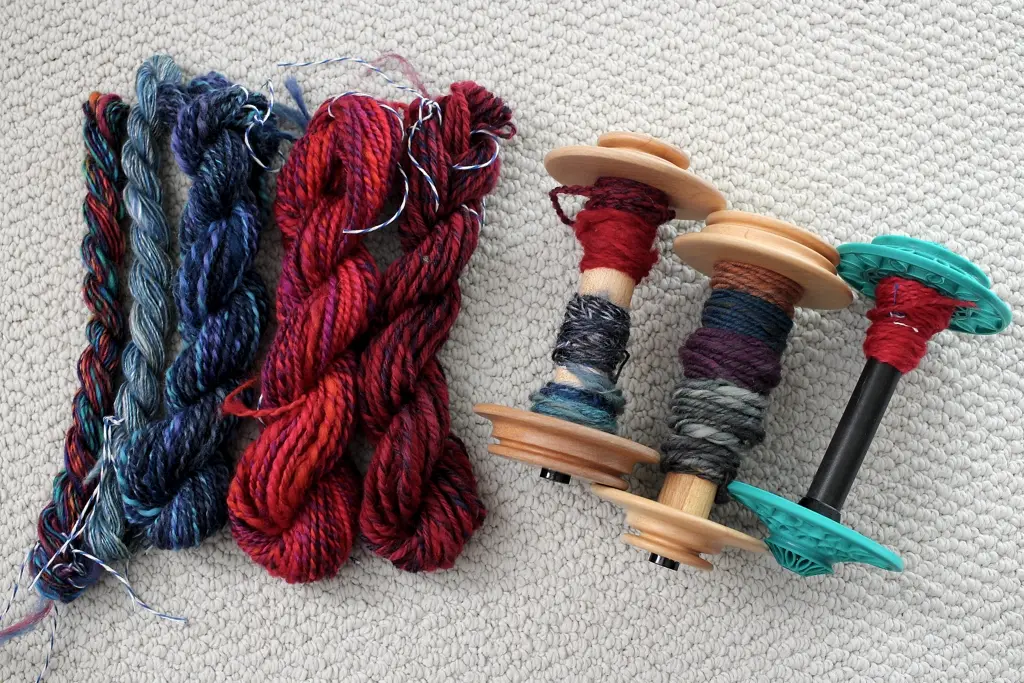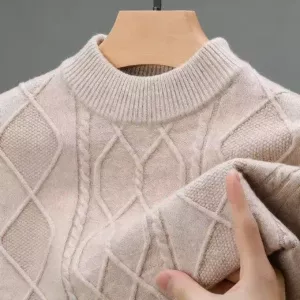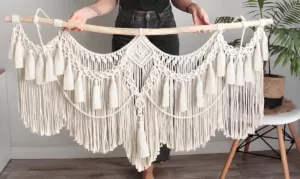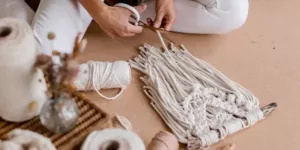Selecting the right yarn involves more than just picking a color or fiber you like; understanding the yarn’s characteristics, including yards per pound (YPP), is crucial for ensuring your project turns out as expected. Here are some tips for selecting the right YPP and understanding other important information on yarn labels to help you make the best choices for your projects.
Tips on Reading Yarn Labels
- Understanding Yardage: Yarn labels usually list the yardage, which tells you how much yarn is in the skein. This is especially important for projects requiring specific yardage to complete. YPP varies by yarn weight, with lighter yarns offering more yards per pound.
- Care Instructions: Always check the care instructions. This information is critical for items that will need washing, such as clothing or blankets. Look for symbols or text indicating whether the yarn is machine washable or if it requires hand washing, and the recommended drying method.
- Gauge: Gauge refers to the number of stitches per inch and rows per inch you can expect using a particular yarn with recommended hook or needle sizes. This is a crucial factor when planning projects that require a specific fit, such as sweaters or hats.
Understanding Yarn Weight Symbols and Categories
Yarn weight determines how thick or thin the yarn is, affecting how it drapes, the appearance of the stitches, and the gauge of the project. Yarn weight categories range from lace (0) to super bulky (6):
- Lace (0): Ideal for delicate shawls or lightweight projects.
- Superfine (1), Fine (2): Perfect for socks, light garments, and baby items.
- Light (3): Suitable for a bit heavier yet still lightweight garments.
- Medium (4): A versatile weight for a wide range of projects, including sweaters and blankets.
- Bulky (5) and Super Bulky (6): Great for quick projects, warm blankets, and cozy sweaters.
Yarn labels often feature symbols standardized by the Craft Yarn Council, making it easier to understand the weight category at a glance.
Additional Tips:
- Consider the Project: Use the recommended yarn weight for a pattern unless you’re experienced and comfortable making adjustments. This minimizes the risk of your project turning out too large, too small, or with an incorrect drape.
- Fiber Content: Besides YPP and yarn weight, consider the fiber content for its characteristics. For instance, wool is warm and elastic, cotton is cool and less stretchy, and acrylic is easy to care for and durable.
- Swatching: When in doubt, make a gauge swatch. This lets you see how the yarn behaves, including drape and stitch definition, and allows you to adjust needle or hook size if your gauge doesn’t match the pattern.
Selecting the right yarn involves a blend of understanding YPP, gauging, weight, and care instructions. By being informed and attentive to these details, you can choose the best yarn for your project, ensuring success and satisfaction with your finished work.
Where to Purchase Crochet Yarn
When stepping into the colorful world of crochet, finding the perfect yarn is essential. Beginners have several options, from local yarn shops and craft stores to online retailers. Each offers a unique browsing experience, with benefits tailored to different needs and preferences. Additionally, for those looking to support sustainable and ethical practices, platforms like WovenFutures.com offer a unique proposition.
Local Yarn Shops
Pros:
- Personalized Service: Staff often have extensive knowledge and can offer advice on choosing the best yarn for your project.
- Touch and Feel: You can experience the texture and color of the yarn firsthand, ensuring it meets your expectations.
- Support Local Businesses: Purchasing locally helps support your community and often small, independent artisans.
Cons:
- Limited Selection: Some local shops may have a smaller inventory compared to larger stores or online outlets.
- Higher Prices: Specialty yarns found in local shops can be more expensive.
Craft Stores
Pros:
- Wide Selection: Craft stores typically offer a broad range of brands, weights, and fibers, catering to a wide audience.
- Accessibility: With multiple locations, finding a craft store near you is often easy.
- Sales and Discounts: Regular sales and coupons can make yarn more affordable.
Cons:
- Variability in Staff Knowledge: Not all staff may be knitters or crocheters, which can affect the level of advice provided.
- Quality Range: While there’s a wide selection, the quality of yarn can vary, with some brands focusing more on affordability than durability.
Online Retailers
Pros:
- Convenience: Shopping from home at any time offers undeniable convenience.
- Endless Variety: Online stores can stock a much wider selection than physical stores.
- Reviews: Customer reviews can provide valuable insights before making a purchase.
Cons:
- Cannot Touch Before Buying: You won’t be able to feel the yarn or see the true colors before purchasing.
- Shipping Costs and Times: Unless you meet a free shipping minimum, costs can add up, and you’ll have to wait for delivery.
WovenFutures.com: A Sustainable Choice
Pros:
- Ethical and Sustainable: With a commitment to creating social and environmental change, Woven Futures uses organic cotton and upcycled materials for their designs.
- Support Artisans: Purchasing from Woven Futures supports artisans and promotes fair labor practices.
- Eco-Friendly: A focus on zero waste and sustainable practices makes each purchase a step towards a better planet.
Cons:
- Selection: The focus on artisan and environmentally friendly products might mean a narrower selection, especially if you’re looking for specific types of yarn for crochet.
- Price: Ethical and sustainable practices often mean a higher price point due to the quality and care in production.
Choosing the right place to purchase yarn depends on what you value most: the tactile experience of local yarn shops, the convenience and variety of online shopping, or supporting sustainable and ethical practices through platforms like WovenFutures.com. Each option offers a unique set of benefits, allowing you to make the choice that best suits your crochet journey.









